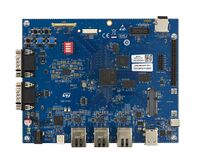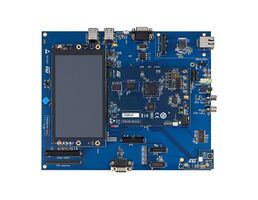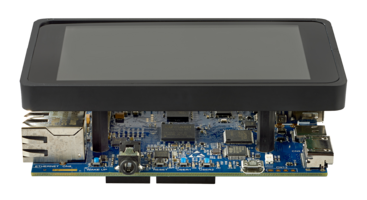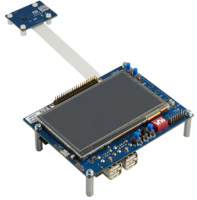1. Article purpose[edit source]
Purpose of this article is to:
- introduce the X-LINUX-RT expansion package
- define the hardware & software deliverables to use the X-LINUX-RT package,
- describe all steps to integrate the X-LINUX-RT package and associated expected results
- give some use case examples enabled by the X-LINUX-RT package
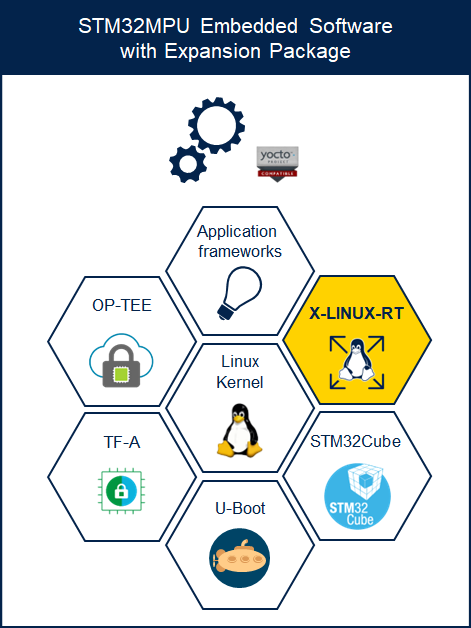
2. X-LINUX-RT expansion package description[edit source]
2.1. Overview[edit source]
X-LINUX-RT is an STM32 MPU OpenSTLinux Expansion Package that targets the real-time (RT) feature in the Linux® kernel.
An RT system is a system that responds to a request in a time lapse and not as fast as possible. It targets:
- Determinism
- LATENCY but not SPEED
For a better understanding about real-time Linux, refer to the Linux RT foundation website[1].
The X-LINUX-RT Expansion Package is mainly designed to be used with Yocto and the OpenSTLinux Distribution Package. However, the following chapters show how to use it either with the OpenSTLinux Distribution Package or with the Developer Package.
2.2. Main software modifications[edit source]
2.2.1. Linux kernel configuration[edit source]
The Linux kernel configuration must be modified to enable:
- CONFIG_PREEMPT_RT : RT feature in kernel
- CONFIG_HIGH_RES_TIMERS : high resolution timer support
2.2.2. OP-Tee OS board device trees[edit source]
Power management is not "compliant" with a real-time context as it changes the system behavior. Because there is no more frequency scaling, and to ensure an optimal lifetime for the microprocessor, the frequency is fixed following the recommended industrial profile.
2.3. Versioning[edit source]
If any, precise here the version of the X-LINUX-NAME expansion package to use
- X-LINUX-NAME package software
- names of software,
- revision number.
2.4. Associated licenses[edit source]
3. Prerequisites[edit source]
3.1. Hardware prerequisites[edit source]
- STM32 MPU Board
3.2. Software prerequisites[edit source]
The X-LINUX-RT Expansion Package runs with OpenSTLinux ecosystem release v5.0.0 ![]() to v5.1.0
to v5.1.0 ![]() .
.
4. Software setup[edit source]
4.1. How to get software[edit source]
X-LINUX-RT Expansion Package is delivered in a git repository on Github.
For ecosystem release v5.1.0 ![]() :
:
pushd <Distribution Package installation directory>/layers/meta-st git clone -b mickledore https://github.com/STMicroelectronics/meta-st-x-linux-rt.git cd meta-st-x-linux-rt git reset --hard openstlinux-6.1-yocto-mickledore-mpu-v24.06.26 popd
For ecosystem release v5.0.0 ![]() only:
only:
pushd <Distribution Package installation directory>/layers/meta-st git clone -b mickledore https://github.com/STMicroelectronics/meta-st-x-linux-rt.git cd meta-st-x-linux-rt git reset --hard openstlinux-6.1-yocto-mickledore-mp1-v23.06.21 popd
5. How to run RT feature ...[edit source]
To check that the RT feature is enabled and functional, the following commands can be executed.
5.1. Use cases execution and expected results[edit source]
5.1.1. Check the Linux kernel version[edit source]
uname -s -r -v
| Without the RT feature |
Linux 6.1.82 #1 SMP PREEMPT Fri Mar 15 14:04:26 UTC 2024 |
|---|---|
| With the RT feature |
Linux 6.1.82-rt27 #1 SMP PREEMPT_RT Fri Mar 15 18:27:50 UTC 2024 |
5.1.2. Cyclictest[edit source]
Cyclictest accurately and repeatedly measures the difference between the time at which a thread is intended to wake up and the time at which it actually wakes up.
For a better understanding of cyclictest, refer to the cyclictest webpage in the Linux RT foundation website[2].
For example, the following command can be used:
cyclictest --mlockall -t -a --priority=99 --interval=200 --distance=0 -l 1000
| Without the RT feature |
policy: fifo: loadavg: 1.96 0.65 0.23 4/186 1671 T: 0 ( 1667) P:99 I:200 C: 1000 Min: 21 Act: 40 Avg: 33 Max: 103 T: 1 ( 1668) P:99 I:200 C: 882 Min: 21 Act: 58 Avg: 42 Max: 187 |
|---|---|
| With the RT feature |
policy: fifo: loadavg: 3.18 1.17 0.43 1/226 1776 T: 0 ( 1775) P:99 I:200 C: 1000 Min: 21 Act: 24 Avg: 28 Max: 90 T: 1 ( 1776) P:99 I:200 C: 842 Min: 20 Act: 42 Avg: 23 Max: 48 |
Note: OPTEE HSI cyclic calibration was desactivated for this test
5.2. Use case restrictions[edit source]
Latency can be improved by disabling some features or services:
* weston
* systemd
* netdata
* OPTEE HSI cyclic calibration
A new distribution named openstlinux-rt is provided. This distribution is using SysVInit instead of Systemd, no Weston, no OPTEE HSI cyclic calibration and no netdata services.
To select it, run following command:
DISTRO=openstlinux-rt MACHINE=<your machine> source layers/meta-st/scripts/envsetup.sh
RT performances are improved.
cyclictest --mlockall -t -a --priority=99 --interval=200 --distance=0 -l 1000 WARN: stat /dev/cpu_dma_latency failed: No such file or directory policy: fifo: loadavg: 0.55 0.62 0.36 1/133 648 T: 0 ( 647) P:99 I:200 C: 1000 Min: 17 Act: 18 Avg: 21 Max: 45 T: 1 ( 648) P:99 I:200 C: 781 Min: 17 Act: 23 Avg: 18 Max: 36
6. References[edit source]
